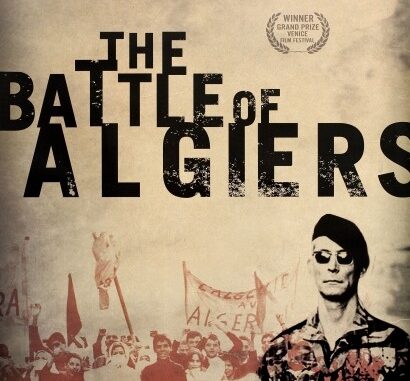
By Shea Stevenson
If you’re reading this, I bet you live in New York City. By some metrics, NYC is the colonial heart of the world, where if any country and her workers are exploited, you’re never more than a couple of miles from some of the grist that was stolen from those laborers.
If a people are exploited for gain, those gains coalesce in places like New York. Not evenly, of course (we have seen the subways and buses), but you can see those gains when you’re in Manhattan and the sky is nearly blotted out by the white marble buildings on Wall Street. Nevertheless, if you were raised in the USA, this is a lens that you, perhaps unconsciously, inherit. Unless you go out of your way to find stories from different perspectives, the things you’ll hear from the media, the movies, your favorite sitcoms, etcetera, are more or less content imperialism, or at least (these days) yearning for a greater police state.
“The Battle of Algiers” is an Italian/Algerian movie from 1966 whose title tells you what you need to know. It’s about the Battle of Algiers, in which the Algerian resistance ousted their French colonizers and eventually liberated Algeria from the French military. It was filmed only a few years after the actual war, and some of its stars are veterans and survivors of the real conflict. All actors are nonprofessionals except for one, the lead French officer.
Two things about this movie: it is very good, and if you’ve grown up in an imperialist nation (and odds are you have), it’s morally imperative to have seen it.
“Battle of Algiers” is a didactic war movie; it has two main modes and both involve teaching you something. The first is that it’s shot to look like newsreel footage from the actual conflict, and parts of it are so convincing that when the movie eventually came out in the U.S., it came with a disclaimer that they didn’t actually use any war footage. The shots are often framed in ways that we’re used to seeing from western journalists in conflicts like this, like being behind the French soldiers, barred from close action until it’s dramatically necessary.
The other mode is in some ways more subtle: it’s obvious propaganda. The subtlety comes from the fact that if this is propaganda, so are most of the war movies you’ve ever seen, so it feels strange at first to see it used for the opposite side, anti-colonialists. This is not a movie about brave western soldiers marching into a dangerous and oil-rich land, but one of violent resistance to that western conquest and oppression. It engages honestly with ethical questions about its violence, but its stance is resolute and obvious: of course we must resist. It’s for freedom by any means necessary.
The movie is also teaching its audience in a more simple way. It says “here is what happened, here is how we did it, here is what western nations said to us as we did it.” It spends a long time tracing the process of recruitment, guerilla urban warfare tactics, and the basic logistics of what we’d call terrorism.
Beyond being a landmark movie in cinematic history for its particular effectiveness in its Italian neo-realist style, it’s important because movies are machines for empathy (as perhaps all stories are). When you’re watching something, or surveying what sorts of stories are made available to you, it is always useful to ask who you are being asked to empathize with and to what end. In the “Battle of Algiers,” those answers are obvious and not ones you’ve likely seen before. It wants you to see the righteousness of this war and this cause.
In particular, then, what makes “The Battle of Algiers” enlightening even to a modern American audience is that we live in one of the most heavily propagandized nations in the world, are surrounded by unimaginable wealth disparity, and subsist on these ill-gotten-gains whether we, as citizens, like it or not. We are predisposed against a story like “The Battle of Algiers” because it’s about the killing of colonial police, acts of terrorism against Europeans, and its unabashed endorsement of those means to its ultimate end of freedom for the Algerian people.
Regardless of what you take from a viewing, to hear the pendulum swing so far in the opposite direction from what you’d see from America is innately useful to you as a human being with your own ideas and your own sense of morality. It allows you, at least, to better understand the intent and the nature of the colonialist narratives you’ve spent your life accustomed to.
